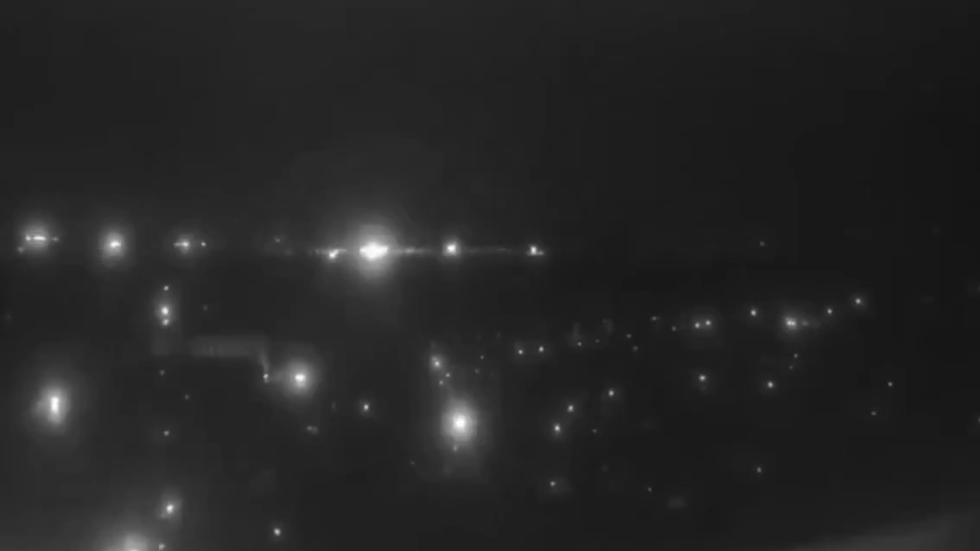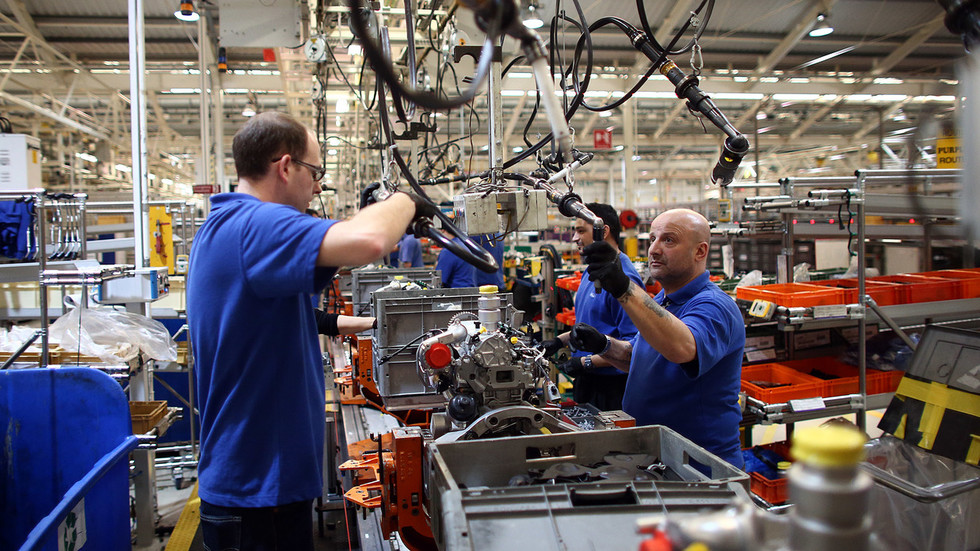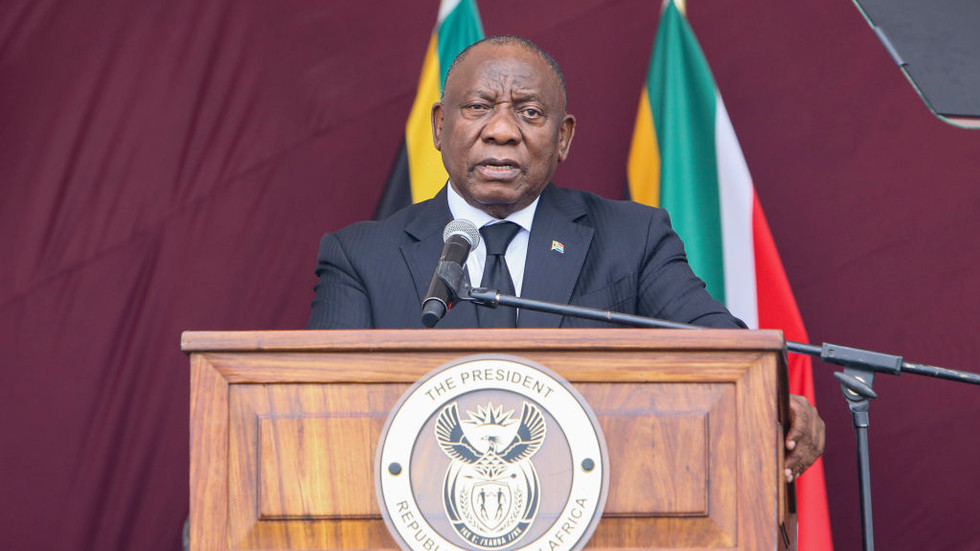What you need to know
- An exit poll in the Netherlands points to a tight race between the Green/Labour alliance and Geert Wilders' far-right party
- Ireland and the Czech Republic go to the polls on Friday while the other member states will vote over the weekend
- The European Parliament elections have gotten underway amid fear of a surge in far-right parties across the bloc
Here are the latest updates from the first day of voting in the EU's parliamentary election on Thursday, June 6, 2024:
06/06/2024June 6, 2024
Exit poll predicts tight race between far right and center left in the Netherlands
An exit poll published by national broadcaster NOS has suggested that the center left alliance and Geert Wilders' far-right party were neck-and-neck in the vote for the European Parliament.
The exit poll of around 20,000 Dutch voters predicted the Green/Labour alliance of former European Commissioner Frans Timmermans was set to gain eight seats in Thursday's election.
Wilders and his far-right Freedom Party were projected to win seven, according to NOS.
The exit poll has an error margin of roughly one seat.
Thirty-one of the European Parliament's 720 seats are up for grabs in the Netherlands. It was the first EU country to vote in the EU elections, which are taking place over four days.
The final results for the Netherlands will be announced on Sunday evening once the bloc's other member states have held their votes.
https://p.dw.com/p/4gknF
Skip next section EU lawmakers accuse far right of peddling fear without solutions06/06/2024June 6, 2024
EU lawmakers accuse far right of peddling fear without solutions
The far right is poised to tap into the fears of voters in the European Union elections, two senior lawmakers said in interviews with DW's Conflict Zone.
But they said this won't necessarily bring about solutions.
"The populists need problems for their political survival. They will never have an interest to solve them," said Manfred Weber, president of the conservative European People's Party.
Vera Jourova, the EU Commission vice-president for values and transparency, also noted that the far right has beenriding a wave of widespread frustration thanks to the COVID-19 pandemic, economic stagnation and wars.
"When we see that the far right is on the rise, I think they have a good analysis of the troubles of people and they are responding to them. The problem is that in many ways they are lying to people that there are easy solutions," she said.
You can watch the full episode of Conflict Zone below.
Brussels leaders: Far right surge ‘will weaken’ EU
https://p.dw.com/p/4gkhf
Skip next section Results of EU vote will come down to turnout: DW correspondent06/06/2024June 6, 2024
Results of EU vote will come down to turnout: DW correspondent
Polls show the far-right Freedom Party of Dutch firebrand Geert Wilders could make big gains in the EU elections.
The party is projected to claim up to nine European Parliament seats.
But the results will ultimately come down to voter turnout, says DW correspondent Jack Parrock in Amsterdam.
"EU turnout for the elections is stubbornly low," he said, pointing out that five years ago, "in the Netherlands, it was just over 40%."
Exit polls will come out at around 9 p.m. local time (1900 UTC/GMT), but official results are only expected on Sunday evening, once voting across the bloc has ended.
Parrock said one reason the far right is proving popular with many Dutch voters is because they have pledged to fight some of the laws introduced in recent years.
"For instance, there's a big farming community here in the Netherlands that has been hit hard, they say, by EU green laws that have been brought in over the last few years, and they've pushed the European Union to have some of them wound back."
"So that is something that voters are voting for," Parrock said.
But he pointed out that people in cities often have different priorities to those in more rural areas.
"Interestingly, here in the metropolitan city of Amsterdam, a lot of the people I spoke to are most concerned about climate change, about green issues, and are voting based on that."
Netherlands kicks off European Union elections
https://p.dw.com/p/4gkea
Skip next section Greens flagging in polls ahead of EU elections06/06/2024June 6, 2024
Greens flagging in polls ahead of EU elections
Support for the Greens has dipped in the leadup to the European Parliament elections, according to opinion polls.
The party dominated the 2019 EU vote with strong backing from young voters, but that performance is unlikely to be repeated this time around.
Analysts say Green parties across the bloc are caught in a dilemma amid rising concerns about security and the cost of living.
For more, check out the video below.
Greens polling badly ahead of EU elections
https://p.dw.com/p/4gkbV
Skip next section European citizens increasingly attached to EU, study suggests06/06/2024June 6, 2024
European citizens increasingly attached to EU, study suggests
European Union citizens feel increasingly attached to the bloc, according to a new report released Thursday.
The joint study conducted by two German institutes, Saarland University and the University of Marburg, used data from 600,000 respondents to a survey conducted across the EU's 27 member states between 1991 to 2023.
The study, published in the Journal of European Public Policy, showed support for the EU had risen across all generations and age groups.
Crises such as Russia's invasion of Ukraine and the global coronavirus pandemic were seen as reasons for strengthened cohesion, the study suggested.
Of additional interest, it showed that younger people — sometimes believed to be more supportive of the EU, having benefited from exchange programs and greater travel opportunities — were not outliers in their feelings.
The study's release came as the four-day European Parliament elections got underway. Some 360 million people across the EU's 27 member states are eligible to cast ballots in the polls.
https://p.dw.com/p/4gkMA
Skip next section Germany: Flooding disrupts EU parliament election process06/06/2024June 6, 2024
Germany: Flooding disrupts EU parliament election process
Recent floods in southern Germany have affected voting for European Parliament elections, an election official in the state of Bavaria told the German news agency DPA.
Thomas Gössl was cited by DPA as saying that town halls were not usable in some affected areas of the southeastern state, leading to the establishment of provisional municipal administrations.
He said citizens who lost voting documents due to floods should contact their local authority to request new documents. Some polling stations would also need to be relocated.
Gössl was, however, confident that the election could be carried out properly despite the damage caused by the floods.
https://p.dw.com/p/4gjMH
Skip next section Wilders rails against EU immigration policy as he casts his ballot06/06/2024June 6, 2024
Wilders rails against EU immigration policy as he casts his ballot
Geert Wilders, of the far-right PVV, was among the first senior politicians to vote on Thursday.
Six months ago, his party sent ripples across Europe by becoming the biggest party in the Dutch national parliament.
He is looking to build on that popularity and set the tone for much of the bloc, with calls to give powers back to national capitals and away from the EU so member countries have more autonomy on issues such as migration.
At the same time, Wilders wants to get more powers in the European parliament to weaken the bloc from within.
"You also need to have a strong presence in the European Parliament and make sure that, if necessary, we will be able to change the European guidelines in order to be in charge of our own immigration policy and asylum policy," news agency AP cited Wilders as saying after voting in The Hague.
He called for a broad alliance of far-right parties to break up the traditional coalition of Christian Democrats, Socialists, pro-business Liberals and Greens.
"Making a larger group in the European Parliament," Wilders said, "that gives us power to change all those European regulations in order to be more in charge of it ourselves — here in the national parliaments."
Cutting down the democratic establishment?
https://p.dw.com/p/4gijC
Skip next section Young voters expected to give boost to the far right06/06/2024June 6, 2024
Young voters expected to give boost to the far right
Young voters fueled a Green wave in 2019. Now, under-30s seem poised to boost the far right in the European Parliament.
It's not quite a youth wave, but eurosceptic, anti-immigrant parties are no longer just for the old.
DW's Ella Joyner analyzes the role of young people in the rise of far-right parties.
https://p.dw.com/p/4giKE
Skip next section How are Germans likely to vote?06/06/2024June 6, 2024
How are Germans likely to vote?
Polls in Germany suggest the center-right Christian Democrats (CDU) are likely to fare best. But the far-right Alternative for Germany (AfD) has also performed well in the polls, despite being mired in controversy.
German polls will open on Sunday.
EU election: Will Germans vote left, right, or far right?
https://p.dw.com/p/4giJq
Skip next section Will this election see a higher voter turnout?06/06/2024June 6, 2024
Will this election see a higher voter turnout?
The EU election is the world's second-biggest democratic exercise after the election in India.
Mobilizing the 350 million people eligible to cast ballots in the EU is not straightforward. Voter turnout was around just 50% in 2019.
Higher voter turnout is projected for the 2024 vote, according to a poll conducted earlier this year in which 60% of voters said they were interested in the election. Higher turnout could prove decisive in a vote that members of both the left and right have called crucial.
DW’s Bernd Riegert takes a look at the impact this could have on the 2024 election.
https://p.dw.com/p/4giJd
Skip next section EU election 2024: What to expect06/06/2024June 6, 2024
EU election 2024: What to expect
Following the Netherlands on Thursday and Ireland and the Czech Republic on Friday, other EU member states will hold their polling over the weekend. Germany is set to vote on Sunday.
The vote could see close to 360 million people across the 27 EU member nations cast their ballots over a period of four days.
However, turnout is traditionally rather low. In 2019, the share of people voting across the bloc reached a record high of just over 50%.
Europe-wide results are slated to be announced on Sunday night after all European countries have completed voting.
The European Parliament is elected every five years with EU citizens choosing their representatives as Members of the European Parliament (MEPs).
The body can have a large impact on the lives of EU citizens, passing laws ranging from economic policy to security and climate change.
This year's vote takes place amid increased uncertainty as the bloc reels from the effects of the COVID-19 pandemic, a weak economic recovery, the fallout from Russia's full-scale invasion of Ukraine, tensions over rising immigration and the threats posed by climate change — which are already being felt through the wildfires, droughts and floods that have hit different parts of the bloc.
It is also the first election since Brexit, when the United Kingdom formally left the EU.
https://p.dw.com/p/4giHh
Skip next section Polls open in The Netherlands06/06/2024June 6, 2024
Polls open in The Netherlands
 The election is set to define the course of the EU for the next five yearsImage: Robin Utrecht/picture alliance
The election is set to define the course of the EU for the next five yearsImage: Robin Utrecht/picture allianceThe Netherlands on Thursday kicked off a bloc-wide election marathon for the European Parliament.
The country is the only EU member state to start its polling so early, followed by Ireland on Friday.
Dutch voters are set to provide an early litmus test of how far right the next EU parliament might shift as surveys show that an increased number of voters are considering voting for extreme right-wing parties.
The Freedom Party (PVV) of Geert Wilders, the surprise winner of national elections last November, is projected to top the EU ballot in the Netherlands.
The PVV dropped its vow of a "Nexit" referendum on leaving the 27-member bloc but the party's manifesto remains fiercely eurosceptic.
A post-poll survey for the Netherlands will be aired Thursday night by national broadcaster NOS, giving a partial glimpse of what could come.
dvv/ab (dpa, Reuters, AFP, AP)
https://p.dw.com/p/4giGj

 5 months ago
28
5 months ago
28








